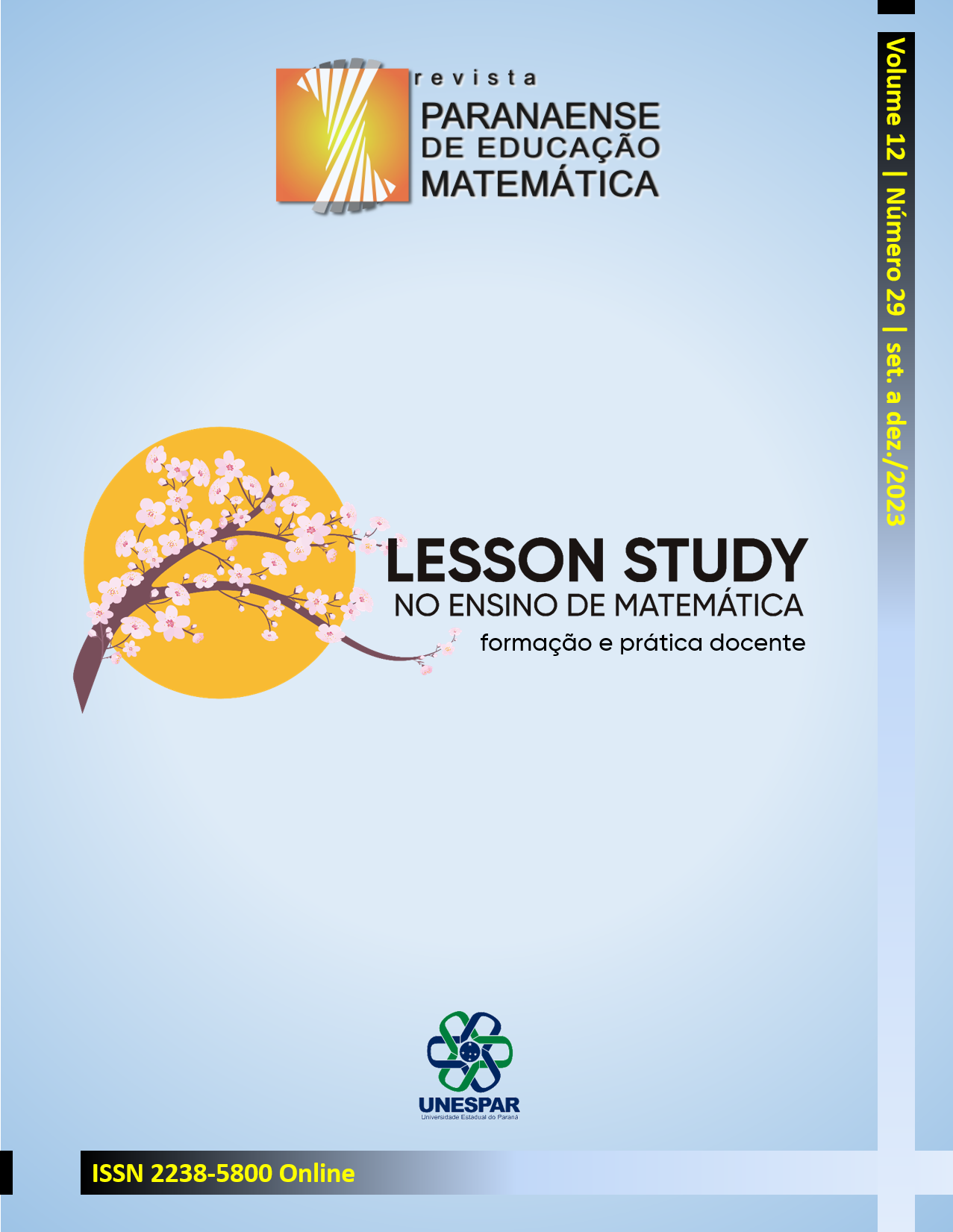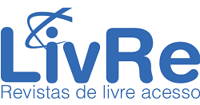PLANNING A MATHEMATICAL TASK: THE TRAINER'S ACTIONS IN A LESSON STUDY
ações do formador em um Estudo de Aula
DOI:
https://doi.org/10.33871/22385800.2023.12.29.406-427Abstract
The aim of this research was to understand how the teacher educator's actions took place during the planning of a mathematical task by a group of teachers participating in a process of continuing education for a master's degree course in 2018, from the perspective of Lesson Study, and what learning opportunities were generated in this way. The interpretative qualitative method, used as a direction and analysis, went through the collaborative dialogues (recorded in audios and later transcribed) of the teachers and the trainer during the planning stage, making it possible to access the discussions of points that influenced the resolution of a task such as: the objective and clear statement, the content involved, the resources and the possible expectations of resolutions that could arise by the students during the future implementation of the task. The analysis pointed to the importance of the trainer's actions and role in guiding ideas and discussions, providing teachers with different learning opportunities, especially in terms of understanding how to conduct tasks for different contents and reflections on intervention directions aimed at recognizing the mathematical concepts involved and their construction. This process resulted in the reformulation of the task statement, generating new discussions and reflections, resulting in a planned task.
Downloads
References
AGUIAR, M; DONÁ, E. G.; JARDIM, V. B. F.; RIBEIRO, A. J. Oportunidades de aprendizagem vivenciadas por professores de matemática: desvelando as ações e o papel do formador durante um processo formativo. Acta Scientiae. Canoas, v. 23, n. 4, p. 112-140, 2021. DOI: https://doi.org/10.17648/acta.scientiae.6575.
AGUIAR, M.; RIBEIRO, A. J. Oportunidades de aprendizagem vivenciadas por professores de matemática: experiências advindas de um processo formativo ancorado na prática docente. Revista Paradigma, v. 43, n. 1, p. 273-296, 2022. DOI: 10.37618/PARADIGMA.10112251.2022.p273-296.id1172.
BALL, D. L.; COHEN, D. K. Developing Practice, Developing Practitioners: Toward a Practice-Based Theory of Professional Education. In: SYKES, G.; DARLING-HAMMOND, L. (Eds.), Teaching as the Learning Profession: Handbook of Policy and Practice. San Francisco: Jossey Bass, p. 3-32, 1999.
BLANTON, M. L.; KAPUT, J. J. Characterizing a classroom practice that promotes algebraic reasoning. Journal for Research in Mathematics Education, v.36, n.5, p.412-446, 2005.
BOGDAN, R.; BIKLEN, S. Investigação qualitativa em educação. Porto: Porto Editora, 1994.
BRASIL. Ministério da Educação. Base Nacional Comum Curricular. Brasília: MEC, 2018. Disponível em: http://basenacionalcomum.mec.gov.br/abase/. Acesso em 31 ago. 2023.
CABRAL, S. A. B.; DOS SANTOS, L. Desenvolvimento profissional de professores de matemática: desafios e possibilidades em um curso de formação continuada. Revista de Investigação e Divulgação em Educação Matemática, v. 7, n. 1, 2023. DOI: 10.34019/2594-4673.
CARNEIRO, L. F. G.; ARAMAN, E. M. O.; SERRAZINA, M. L. Raciocínio Matemático de Alunos do Ensino Fundamental: estratégias de generalização empírica. Bolema, Rio Claro, v. 36, n. 74, p. 1193-1214, 2022. DOI: http://dx.doi.org/10.1590/1980-4415v36n74a12.
CARRILLO, J. et al. The mathematics teacher’s specialized knowledge (MTSK) model. Research in Mathematics Education, v. 20, n. 3, p. 236 - 253, 2018. DOI: http://dx.doi.org/10.1080/14794802.2018.1479981.
ELIAS, H. R.; TREVISAN, A. L. Desafios à constituição de grupos colaborativos com professoras de anos iniciais para a realização de estudos de aula. Vidya (Santa Maria - online), v. 40, n.2, p. 183-202, 2020. DOI: https://doi.org/10.37781/vidya.v40i2.3233.
GROSS, G. F. S.; TREVISAN, A. L.; ARAMAN, E. M. O.; TREVISOLLI, R. F. L. Uma Proposta para Elaboração e Análise de Tarefas de Aprendizagem Profissional. Perspectivas da Educação Matemática, v. 16, n. 42, p. 1-21, 2023. DOI: 10.46312/pem.v16i42.17982.
LEWIS, J. M. Learning to lead, leading to learn: How facilitators learn to lead lesson study. ZDM, v. 48, n. 4, p. 527-540, 2016. DOI 10.1007/s11858-015-0753-9.
MATA-PEREIRA, J.; PONTE, J. P. da. Desenvolvendo o raciocínio matemático: Generalização e justificação no estudo das inequações. Boletim do GEPEM, v. 62, p. 17-31, 2013. DOI: https://doi.org/10.4322/gepem.2014.021.
PEREIRA, L. S. A. A gestão de tarefas matemáticas por professoras dos anos iniciais do ensino fundamental. 2019. 161 f. Dissertação (mestrado em Ensino) – Universidade Estadual do Sudoeste da Bahia, Programa de Pós-Graduação em Ensino – PPGEn, Vitória da Conquista, p. 161, 2019. Disponível em: <https://n9.cl/yfjs9>. Acesso em 09 set. de 2023.
PESSOA, C.; BORBA, R. Quem dança com quem: o desenvolvimento do raciocínio combinatório de crianças de 1ª a 4ª série. Zetetiké, v. 17, n. 31, p. 105-150, 2009.
PONTE, J. P. Gestão curricular em Matemática. O professor e o desenvolvimento curricular, p. 11-34, 2005.
PONTE, J. P. da; BROCARDO, J.; OLIVEIRA, H. Investigações matemáticas na sala de aula. Belo Horizonte: Autêntica, 2009.
POZZOBON, M. C. C. O estudo de aula e Matemática: “processo formativo” e “potencialidades para o desenvolvimento profissional”. Amazônia: Revista de Educação em Ciências e Matemáticas, v. 19, n. 42, p. 70-85, 2023. DOI: http://dx.doi.org/10.18542/amazrecm.v19i42.13440
PREDIGER, S., L. T.; ROESKEN-WINTER, B. Drei-Tetraeder-Modell der gegenstandsbezogenen Professionalisierungsforschung: Fachspezifische Verknüpfung von Design und Forschung. Jahrbuch für Allgemeine Didaktik, 2017, p. 159–177, 2017.
QUARESMA, M.; PONTE, J. P. da. Comunicação, tarefas e raciocínio: aprendizagens profissionais proporcionadas por um estudo de aula. Zetetiké, v. 23, n. 2, p. 297-310, 2015. DOI: https://doi.org/10.20396/zet.v23i44.8646540.
RIBEIRO, A. J; AGUIAR, M.; TREVISAN, A. L. Oportunidades de aprendizagem vivenciadas por professores ao discutir coletivamente uma aula sobre padrões e regularidades. Quadrante, v. 29, n. 1, p. 52–73, 2020. DOI: https://doi.org/10.48489/quadrante.23010.
RIBEIRO, A. J.; PONTE, J. P. Um modelo teórico para organizar e compreender as oportunidades de aprendizagem de professores para ensinar matemática. Zetetiké, Campinas, SP, v. 28, p. 1-20, 2020. DOI: https://doi.org/10.20396/zet.v28i0.8659072.
SHULMAN, L. Those who understand: Knowledge growth in teaching. Educational researcher, v. 15, n. 2, p. 4-14, 1986. DOI: https://doi.org/10.3102/0013189X015002004.
SILVA, E. A. As metodologias qualitativas de investigação nas Ciências Sociais. Revista Angolana de Sociologia, n. 12, p. 77-99, 2013. DOI: https://doi.org/10.4000/ras.740.
SPINILLO, A. G.; LAUTERT, S. L.; SANTOS, E. M. A importância da explicitação da correspondência um para muitos na resolução de problemas de estrutura multiplicativa. Bolema, Rio Claro, v. 35, n. 69, p. 112-128, 2021. DOI: https://doi.org/10.1590/1980-4415v35n69a06.
STEIN, M. K; ENGLE, R.; SMITH, M.; HUGHES, E. Orchestrating productive mathematical discussions: five practices for helping teachers move beyond show and tell. Mathematical Thinking and Learning, v. 10, n. 4, p. 313–340, 2008.
STEIN, M. K.; SMITH, M. S. Tarefas matemáticas como quadro para a reflexão: da investigação à prática. Educação e Matemática, v. 105, n. 5, p. 22-28, 2009.
TREVISAN, A. L.; RIBEIRO, A. J.; PONTE, J. P. Professional learning opportunities regarding the concept of function in a practice-based teacher education program. International Electronic Journal of Mathematics Education, v. 15, n. 2, p. 1-14, 2020. DOI: https://doi.org/10.29333/iejme/6256.
UTIMURA, G. Z.; BORELLI, S. S.; CURI, E. Lesson Study (Estudo de Aula) em diferentes países: uso, etapas, potencialidades e desafios. Educação Matemática Debate, v. 4, n. 10, p. 1-16, 2020. DOI: https://doi.org/10.24116/emd.e202007.
Downloads
Published
How to Cite
Issue
Section
License
Copyright (c) 2023 Revista Paranaense de Educação Matemática

This work is licensed under a Creative Commons Attribution-NonCommercial-NoDerivatives 4.0 International License.










